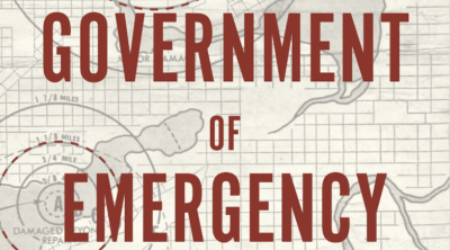Alumni
Interview
Published September 8, 2023
Gender and Political Gatekeepers: A Visual Interview with Melanie Phillips
How do we understand the barriers that women face in becoming political candidates? Read our interview with Melanie L. Phillips, who completed her PhD in the Charles and Louise Travers Political Science Department at Berkeley in 2023 and is currently a Lecturer in the Political Science Department and a Research and Evaluation Associate at School-to-School International.
Learn More >Symposium
Recap
Published August 1, 2023
DEEPFAKE: A Rhetorical and Economic Alternative to Address the So-Called “Post-Truth Era”
Recorded on May 10, 2023 at Social Science Matrix, this symposium aimed to develop a critique of the current debates about Post-Truth and fakeness, and specifically of Big Tech’s effort to frame the political expression of the demos as it solidifies its control over the digital economy.
Learn More >Article
Interview
Published August 1, 2023
Advancing Computational Psychology: A Visual Interview with Bill Thompson
Read an interview with UC Berkeley cognitive scientist Bill Thompson, who uses computational methods and large-scale experiments to understand problems like knowledge transmission, the universality of language categories, and the social aspects of human problem-solving.
Learn More >Social Science / Data Science
Recap
Published April 15, 2023
Jo Guldi: Towards a Practice of Text Mining to Understand Change Over Historical Time
Recorded on March 8, 2023, this video features a lecture by Jo Guldi, Professor of History and Practicing Data Scientist at Southern Methodist University. Co-sponsored by Social Science Matrix, the UC Berkeley Department of History, and D-Lab, the talk was presented as part of the Social Science / Data Science event series.
Learn More >Panel
Recap
Published April 15, 2023
Economics and Geopolitics in US International Relations: China, Europe, and the Global South
The pandemic and the war in Ukraine have reshaped global geopolitics, trade, and security. How will these changes affect the relationship between the US and China, Europe, and the Global South? How will they impact US firms operating globally, and how might foreign leaders — and notably the Chinese leadership — respond? Recorded on […]
Learn More >Matrix On Point
Recap
Published April 15, 2023
Matrix on Point: Myths and Misinformation
In this panel, recorded on March 15, 2023, a group of scholars who study false histories and conspiracy theories discussed how misinformation circulates, and the effects of such myths and stories on society.
Learn More >Matrix Lecture
Recap
Published March 1, 2023
Mariano-Florentino Cuéllar: Reimagining Global Integration
Recorded on February 15, 2023, this Matrix Distinguished Lecture featured Mariano-Florentino Cuéllar, President of the Carnegie Endowment for International Peace, presenting a talk entitled "Reimagining Global Integration." A former justice of the Supreme Court of California, Justice Cuéllar served two U.S. presidents at the White House and in federal agencies, and was a faculty member at Stanford University for two decades. Watch a video of the lecture — or listen to the recording.
Learn More >Lecture
Recap
Published February 18, 2023
Citrin Award Lecture: “Does Political Propaganda Work,” Donald P. Green
Recorded on February 10, 2023, this video features the 2022 Citrin Award Lecture, presented by Donald P. Green, J.W. Burgess Professor of Political Science at Columbia University. Professor Green's lecture, "Does Political Propaganda Work?", was presented by the Jack Citrin Center for Public Opinion Research at UC Berkeley.
Learn More >Authors Meet Critics
Recap
Published November 3, 2022
Voices in the Code: A Story About People, Their Values, and the Algorithm They Made
Recorded on October 10, 2022, this “Authors Meet Critics” panel focused on the book Voices in the Code: A Story About People, Their Values, and the Algorithm They Made, by David Robinson, a visiting scholar at Social Science Matrix and a member of the faculty at Apple University. Robinson was joined in conversation by […]
Learn More >Authors Meet Critics
Recap
Published November 3, 2022
Keeping It Unreal: Black Queer Fantasy and Superhero Comics
Recorded on October 14, 2022, this Authors Meet Critics panel focused on the book "Keeping It Unreal: Black Queer Fantasy and Superhero Comics," by Darieck Scott, Professor of African American Studies at UC Berkeley. Scott was joined in conversation by Ula Taylor and Scott Bukatman, with Greg Niemeyer moderating.
Learn More >Matrix On Point
Recap
Published October 12, 2022
Humanitarian Technologies
Recorded on September 26, 2022, this "Matrix on Point" panel featured a group of scholars — including Daragh Murrah, Fleur Johns, and Wendy H. Wong — examining how technology raises new questions about the efficacy of humanitarian interventions, the human rights of recipients, and the broader power relations between donors and recipients. Moderated by Berkeley Law's Laurel E. Fletcher.
Learn More >Authors Meet Critics
Recap
Published September 21, 2022
The Government of Emergency: Vital Systems, Expertise, and the Politics of Security
Watch the video (or listen to the recording) of our recent "Authors Meet Critics" panel discussion on the book "The Government of Emergency: Vital Systems, Expertise, and the Politics of Security," by Stephen Collier and Andrew Lakoff, which explores the evolution of how experts and officials prepare for catastrophic risks. The authors were joined in conversation by Cathryn Carson and Michael Watts, with Aihwa Ong moderating.
Learn More >










